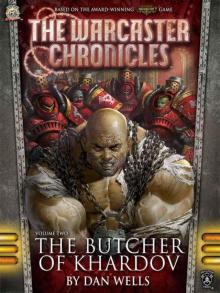Ruins Read online
Page 2
“Yes, but the Partials will be gone,” Hobb repeated. “Delarosa’s plan will work.”
“I don’t think you’re grasping the ramifications here—” said Haru, but Hobb cut him off.
“I don’t think you are either,” Hobb snapped. “What are our options, honestly? Do you think we can stop her? The entire Partial army has been trying to find Delarosa for weeks, and they can’t; we can barely leave this basement without getting shot at, so I’m pretty sure we’re not going to find her either. We could find her strike force, maybe, because we have protocols in place for that, but the team delivering the warhead is likely beyond recall. This bomb is going off, whether we like it or not, and we need to be ready.”
“The Partials will catch her,” said Mkele. “A warhead’s not an easy thing to transport—it’s going to compromise her ability to stay hidden.”
“And if that happens, she might just blow it on sight,” said Hobb. “As long as she’s twenty miles from East Meadow, our major population center is safe, and then the winds will blow the fallout north to White Plains.”
“If she makes it twenty miles,” said Haru.
Tovar raised his eyebrow. “Are we prepared to risk the human race on a bunch of ifs?”
“What are we risking?” asked Hobb. “We send someone to stop her, and everyone else to evacuate the island—we’re not risking anything unless we don’t act.”
“Hobb wasn’t exaggerating about how hard it is to move around,” said Mkele. “Haru can do it because he’s been trained, and he knows the island, but how do you intend to carry out a mass evacuation without drawing attention?”
“We do it after the blast,” said Hobb. “Spread the word, get everything ready, and when the bomb goes off and the occupation force is distracted, we rise up, kill as many Partials as we can, and run south.”
“So your plan is to murder a superior enemy army,” said Tovar, “and then outrun the wind. I’m glad it’s so simple.”
“We have to evacuate first,” said Haru, “now, to avoid even the periphery of the nuclear fallout.”
“We already talked about how that’s not going to work,” said Hobb. “There’s no way to move that many people without the Partials seeing us and stopping us.” He looked at the others. “Remind me why the kid is even here?”
“He’s proven himself valuable,” said Mkele. “We’re not exactly in a position to turn away help.”
“Which is also why you’re still here,” said Tovar.
“My wife and child are in East Meadow,” said Haru, “and you know who they are—every human being alive knows who they are. And that means you know why we don’t have time to waste. Arwen is the only human child in the world, and she’s going to attract some attention—for all we know, they’re already in Partial custody somewhere, ready to be cut open and studied.”
“We can’t lose that child,” said Tovar, and Haru could see that the fear in his face was real. “Arwen represents the future. If she dies in that explosion, or in the fallout after . . .”
“That’s why we have to evacuate now,” said Haru, “before Delarosa detonates that nuke. There’s got to be a way.”
“Hobb’s plan uses the explosion as a distraction,” said Mkele. “But what if we distracted them another way?”
“If we could create a distraction big enough to overthrow the Partials, we’d have done it already,” said Hobb. “The nuke is all we have.”
Mkele shook his head. “We don’t need to overthrow them, just pull their attention. Delarosa’s guerrillas have been doing that already, more or less, but if we went all out—”
“We’d die,” said Tovar. “It’s like Hobb said, if we could do it safely, we’d have done it already.”
“So we don’t do it safely,” said Mkele.
The other men went quiet.
“This is as final and as deadly as any situation can be,” said Mkele. “We’re talking about a nuclear explosion forty miles from the last group of human beings on the planet. Even our best-case scenario, where somebody finds Delarosa and stops her in time, leaves us trapped in the hands of an occupying species that treats us like lab rats. An all-out attack on the Partials is going to kill every human soldier who tries it—none of us hold any illusions about that—but if there’s a chance that the rest of the humans could escape, then how can we possibly argue that it’s not worth it?”
Haru thought about his family: his wife, Madison, and his baby girl. He couldn’t bear to think of leaving Arwen without a father, but Mkele was right—when the only alternative is extinction, an awful lot of horrors become acceptable. “We’re going to die anyway,” he said. “At least this way our deaths will mean something.”
“Don’t go volunteering just yet,” said Tovar. “This is a two-part plan: One group provides the distraction, and the other gets everyone as far south as humanly possible. No pun intended.”
“Then we run,” said Mkele. His voice was somber. “Away from our only source of the cure. Or did we all forget?”
The room fell quiet again. Haru felt a numbness creeping up his legs and back—no matter how far they ran, they still had RM. Arwen was alive because Kira had found a cure in the Partials’ pheromonal system, but so far the humans had been unable to replicate it in a lab. They’d have to start over in a new medical facility, and it could take years just to find one and get it working again—and there was no guarantee that they’d ever be successful. If the Partials died, the cure would almost certainly die with them.
Haru could tell from their faces that the others were thinking of the same insurmountable problem. His throat was dry, and his voice sounded weak when he broke the silence. “Our best-case scenario keeps sliding closer and closer to our worst.”
“The Partials are our greatest enemy, but they’re also our only hope for the future,” said Mkele. He steepled his fingers and pressed them to his forehead a moment before continuing. “Maybe we should take some with us.”
“You say that like it’s easy,” said Haru.
“What do you want to do?” asked Tovar. “Just keep a few in cages and pull out the pheromone when you need it? Doesn’t that seem kind of evil to any of you?”
“My job is to protect the human race,” said Mkele. “If it means the difference between life and extinction, then yes, I will keep Partials in cages.”
Tovar’s face was grim. “I keep forgetting you had this same job under Delarosa.”
“Delarosa was trying to save the human race,” said Mkele. “Her only crime was that she was willing to go too far in order to do it. We decided, briefly, that we didn’t want to go along with her, but look at us: We’re hiding in a basement, letting Delarosa fight our battles, seriously considering letting her deploy a nuclear bomb. We are long past the point where we can pick and choose our morality. We either save our species or we don’t.”
“Yes,” said Tovar, “but I’d prefer it if we were still worth saving by the end of it.”
“We either save our species or we don’t,” Mkele repeated, more forcefully this time. He looked at the other men one by one, starting with Hobb. The amoral senator nodded almost immediately. Mkele turned next to Haru, who stared back only a moment before nodding as well. When the alternative is extinction, all kinds of horrors become acceptable.
“I don’t like it,” said Haru, “but I like it more than everybody dying. We’re out of time for anything better.”
Mkele turned to Tovar, who threw up his hands in frustration. “Do you know how long I fought against these kinds of fascist policies?”
“I do,” said Mkele calmly.
“I started a civil war,” said Tovar. “I bombed my own people because I thought freedom was more important than survival. There’s no point saving us if we lose our humanity in the process.”
“We can change if we live,” said Mkele. “A nation built on slavery can be redeemed, but not if we all die.”
“This is wrong,” said Tovar.
“I never sa
id it wasn’t,” said Mkele. “Every choice we have is wrong. This is the lesser of ninety-nine evils.”
“I’ll lead your distraction,” said Tovar. “I’ll give my life to help the rest of you escape, and I’ll sell that life as dearly as possible. Hell, I’ve always been a better terrorist than a senator anyway.” He stared at them pointedly. “Just don’t give up on goodness yet. Somewhere out there there’s a way to get through this.” He opened his mouth to say something else, but instead just shook his head and turned to leave. “I hope we find it in time.”
Tovar’s hand was inches from the doorknob when suddenly the door shook, practically rattling on its hinges as someone pounded on the other side.
“Senator!” It was a young voice, Haru thought, probably another soldier. Tovar glanced back at the group curiously before opening the door.
“Senator Tovar,” said the soldier, practically tripping over himself in his rush to speak. “The message has stopped.”
Tovar frowned. “The message . . . stopped?”
“The radio message from the Partials,” said the soldier. “They’ve stopped the broadcast. Every channel is clear.”
Mkele stood up. “Are you sure?”
“We’ve scanned every frequency,” said the soldier.
“They’ve found her,” said Haru, stunned by the sudden blend of relief and terror. He’d known Kira for years, and the thought of her in Partial hands was sickening, but at the same time, Kira would be the first to say that one girl was more than a fair trade for the hundreds of people the Partials seemed willing to kill in their search for her. He’d come to hate her for not turning herself in, and eventually convinced himself that she couldn’t possibly still be on the island; she must have either fled or died, or surely she would have come forward by now. No one could stand by silently while so many people were executed. But now, if she’s been captured, maybe that means she’s been here all along. . . . The thought made him furious.
“We don’t know for sure that they’ve found the girl,” said Mkele. “It’s possible that their radio tower’s just failed temporarily.”
“Or maybe they just gave up,” said Hobb.
“Keep monitoring the frequencies,” said Tovar to the soldier. “Let me know the instant you hear anything. I’ll join you when I can.” The soldier nodded and ran off at a dash. Tovar closed and locked the door, keeping their conversation secret—nobody else knew about the nuke, and Haru knew it was wise to keep it that way. “How does this change our plans?” asked Tovar, looking back at the group. “Does it change them at all? There’s still a nuke, and Delarosa’s still probably going through with her plan. Even without the daily executions it’s still just a matter of time, and this is still the strongest blow she can strike against them.”
“If the Partials pull out, it makes the nuke an even more attractive option,” said Mkele, “because it will catch more of them in the blast.”
“And Kira too,” said Haru. He didn’t know how he felt about that.
Tovar smiled sadly. “Twenty minutes ago we were struggling to justify this attack, and now we can’t bear to give it up.”
“Delarosa will go through with her plan,” said Hobb, “and we should go through with ours.”
“Then I guess it’s time to piss off the overwhelming enemy,” said Tovar. He saluted them stiffly, the ex-marine appearing like magic from inside the form of the old, weathered traveler. “It’s been a pleasure serving with you.”
Mkele saluted him back, then turned toward Hobb and Haru. “You’re in charge of the evacuation.”
“He means me,” said Hobb.
“He means us,” said Haru. “Don’t think you’re in charge just because you’re a senator.”
“I’m twice your age.”
“If that’s the best reason you can come up with, you’re definitely not in charge.” Haru stood. “Can you shoot?”
“I’ve trained with a rifle since we founded East Meadow,” said Hobb indignantly.
“Then get your gear ready,” said Haru. “We’re leaving in an hour.” He left the room, deep in his own thoughts. Maybe the Partials really had found Kira—but where? And why now, after all this time?
And now that they had her, what would they do?
CHAPTER THREE
Kira stared up at the surgery robot, a massive metal spider looming down from the ceiling. Twelve sleek, multijointed arms swiveled into place, each tipped with a different medical instrument: scalpels and clamps in half a dozen different sizes, syringes with interchangeable barrels of brightly colored liquid, and spanners and spikes and other devices with functions Kira could only guess at. She’d been in medical training since she was ten—almost eight years ago now—but there were things in here she’d never even dreamed of.
They showed up all the time in her nightmares, though. This was the same facility in Greenwich, Connecticut, where Dr. Morgan had captured her and tortured her before Marcus and Samm had saved her. Now she’d abandoned them both and come back of her own free will.
The spider rotated silently, reaching toward her with sleek steel pincers. Kira suppressed a scream and tried to think calm thoughts.
“Local anesthetic to points four, six, and seven,” said Morgan, tapping the locations on a massive wall screen, where a diagram of Kira’s body hung motionless in the air. “Engage.” The spider reached down without pause or ceremony and plunged its needles into Kira’s hip and abdomen. Kira stifled another scream, gritting her teeth and compressing her fears into a low grunt.
“Such a glowing bedside manner,” said Dr. Vale, standing by another wall. “It warms my heart, McKenna—you’re like a mother hen.”
“I started a war to find this girl,” said Morgan. “You want me to ask permission every time I touch her?”
“A quick ‘This will only hurt a little’ might be nice,” said Vale. “Maybe even an ‘Are you ready, Kira?’ before we start the surgery?”
“As if my answer would change anything?” asked Kira.
Morgan shot her a glance. “You made the choice to be here.”
Vale snorted. “Another answer that didn’t technically change anything.”
“It changed a great deal,” said Morgan, looking back at the wall screen. She plotted out lines for incisions. “It impressed me.”
“Well, then,” said Vale. “By all means, treat her like a lab rat.”
“I was a lab rat last time,” said Kira. “This time is better, believe me.”
“That’s the kind of answer that only makes this worse,” said Vale, shaking his head. “You were always cold, McKenna, but this is the most coldhearted, dehumanizing—”
“I’m not a human,” said Kira, and realized with a start that Morgan had said almost the same thing—“She’s not a human”—simultaneously. They looked at each other for a moment, then Morgan turned back to her wall screen.
“In the interest of”—Morgan paused, as if searching for the right way to say it—“a peaceful working relationship, I will be more communicative.” She tapped a few icons on the wall screen, which split into three sections—the line diagram of Kira’s body on one side, and two half-size boxes on the other showing two sets of data: one labeled “Expiration” and one labeled “Kira Walker.” “Dr. Vale and I were part of the Trust—the group of ParaGen scientists who created the Partials and the RM plague. We didn’t intend for the plague to bring the human race to the brink of extinction, obviously, but the damage is done, and once I realized the humans were a lost cause, I turned my attention to the Partials instead. I’ve spent the last twelve years helping them build a new civilization, trying to find ways to overcome the sterility and other handicaps hardwired into their DNA. Imagine my surprise when they began dying, for no discernible reason, precisely twenty years after they were created.”
Vale spoke up again. “The expiration date was—”
“The expiration date was the surest sign that ‘the Trust’ was a horrible misnomer,” said Morgan. “Living, thin
king beings that I helped create were preprogrammed to wither to dust in a matter of hours the moment they hit their biological deadline, and I knew nothing about it. I’ve been doing everything in my power to fix it, which brings us here.”
“You think I can cure it,” said Kira.
“I think something in your body holds the secret that will help me cure it,” said Morgan. “The last time I had you in a lab, when we discovered you were a Partial—another secret the ‘Trust’ kept from me—my initial scans determined that despite being a Partial, you had none of the genetic handicaps the others have: no sterility, no fixed age, no inhibition of growth or any other human function. If it turns out that you have no expiration date either, there might be a way to reverse engineer certain fragments of your genetic code to help save the rest of the Partials.”
“I’ve already told you that this is impossible,” said Vale. “I’m the one who programmed the expiration date—I’m sorry I couldn’t tell you at the time, but there it is. You were unstable, and no, we didn’t trust you. It wasn’t just you, though—Armin didn’t trust me with some of the pieces, either.”
Armin, thought Kira. My father—or the man I used to think was my father. He took me home to raise as his own, he never even told me what I was. Maybe he would have, one day. Now nobody even knows where he is. She wondered if he was dead. Everyone else in the Trust had survived the Break—Trimble and Morgan here with the Partials, Vale in the Preserve with a group of hidden humans, Ryssdal in Houston working on “environmental issues,” whatever that meant, and Nandita on Long Island with the humans.
Nandita. The woman who raised me, who also didn’t tell me I was a Partial.
Dr. Morgan tried to kill me, but at least she hasn’t pretended to be something she isn’t.
“Even if you can find something in there,” Vale continued, “how are you going to incorporate it into the Partials’ genetic sequence? Gene mods? You’re talking about hundreds of thousands of people—even if we had the facilities and the personnel to mount that kind of a mass modification effort, we don’t have the time to pull it off. How many Partials are left, half a million?”

 Partials
Partials The Devil's Only Friend
The Devil's Only Friend Isolation
Isolation I Don't Want to Kill You
I Don't Want to Kill You Ones and Zeroes
Ones and Zeroes Next of Kin
Next of Kin Over Your Dead Body
Over Your Dead Body Fragments
Fragments Mr. Monster
Mr. Monster The Butcher of Khardov
The Butcher of Khardov I AM NO T A S E RI AL KI L L E R
I AM NO T A S E RI AL KI L L E R Nothing Left to Lose--A Novel
Nothing Left to Lose--A Novel Active Memory
Active Memory A Pear-Shaped Funeral
A Pear-Shaped Funeral I Am Not a Serial Killer
I Am Not a Serial Killer Bluescreen
Bluescreen Ruins
Ruins Zero G
Zero G The Hollow City
The Hollow City Extreme Makeover
Extreme Makeover Partials p-1
Partials p-1 The Complete John Wayne Cleaver Series: I Am Not a Serial Killer, Mr. Monster, I Don't Want to Kill You, Devil's Only Friend, Over Your Dead Body, Nothing Left to Lose
The Complete John Wayne Cleaver Series: I Am Not a Serial Killer, Mr. Monster, I Don't Want to Kill You, Devil's Only Friend, Over Your Dead Body, Nothing Left to Lose